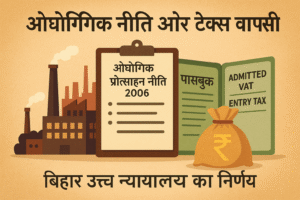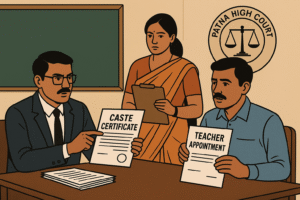The Patna High Court has dismissed a writ petition challenging the termination of a government employee who had secured appointment by projecting himself as a Scheduled Caste (SC) candidate in an SSC recruitment, despite subsequently declaring in his attestation form that he did not belong to SC/ST. The Division Bench (Hon’ble Mr. Justice Shivaji Pandey and Hon’ble Mr. Justice Anjani Kumar Sharan) held on 29 May 2020 that the record demonstrated manipulation and misrepresentation sufficient to justify dismissal after due process.
Simplified Explanation of the Judgment
This case arose from a Staff Selection Commission (SSC) recruitment conducted through an advertisement dated 17 October 1987 for posts including Auditor, Junior Accountant, and Upper Division Clerk. The candidate (referred to here as the petitioner) was recommended by SSC against vacancies earmarked for Scheduled Caste/Scheduled Tribe candidates; seven such names were forwarded, and the petitioner’s name appeared at serial number one in that SC list. Appointment was expressly provisional and subject to verification.
After joining, the petitioner filled an attestation form (18 May 1990) giving his details, naming his father, and, crucially, answering “No” to the question whether he belonged to the SC category. This directly conflicted with the category under which SSC had recommended him. Once SSC learnt that he did not claim SC status in the attestation, the earlier recommendation was withdrawn on 1 August 1990. Later, the department issued a termination order (17 February 1993) invoking Rule 5(1) of the Central Civil Services (Temporary Service) Rules, 1965.
On challenge, the Central Administrative Tribunal (CAT) first set aside the “simple termination,” holding that an enquiry was necessary. A departmental charge-sheet followed, framing two articles of charge. Article I alleged that the petitioner had acted fraudulently by projecting himself as SC and attaching a caste certificate; Article II alleged that while joining he stated in the attestation form that he was not SC/ST, thereby misleading authorities. The disciplinary authority ultimately passed an order of dismissal (4 May 1998), which was affirmed in departmental appeal (30 July 1998). CAT later remanded the matter (3 June 2005) for supply of the enquiry report and note of disagreement and for fresh consideration from that stage; on remand, the disciplinary authority again dismissed the petitioner.
The record placed before the High Court showed multiple tell-tale indicators that the candidature was handled as SC from the outset: the application form carried a “no fee” notation (as fee was not payable by SC candidates at the time), a pasted slip marking “Scheduled Caste (SC)” with roll number, and a tick in the box indicating reserved-category (SC). There was also a caste certificate produced showing SC (Pasi), but with inconsistent parentage details compared to other records. In contrast, the attestation form at joining explicitly stated “No” against SC/ST status.
The Bench examined whether the petitioner could have been selected in the unreserved (General) category on merit, even if not in SC. On SSC’s supplementary materials, the last selected unreserved candidate in the relevant Bihar (Zone-6) had 236 marks (and 219 in a related reserved list), whereas the petitioner had 153 and stood at rank RL1-00073 in the reserved list as an SC candidate. Thus, even assuming he applied as General, he could not possibly have secured selection on his marks. The SSC had, in fact, initially recommended only SC/ST names for those particular vacancies, with no general-category recommendations at that time.
The Court also addressed an earlier phase of the litigation where, in 2015, an order had directed SSC to produce details of the petitioner’s category and merit position. Although at one point an order in 2015 had gone in the petitioner’s favour, later review proceedings reset the matter for a fresh decision. Ultimately, on the complete material, the High Court found clear manipulation: the petitioner had managed to obtain an SC slot despite later denying SC status in the attestation, and his marks did not support a General-category selection.
Applying settled principles that fraud vitiates all acts, the Bench held that dismissal after a procedurally proper enquiry could not be faulted. The Court emphasized that allowing such a candidate to continue would deprive genuine reserved-category candidates and undermine the integrity of recruitment. The writ petition was therefore dismissed.
Significance or Implication of the Judgment
This decision underscores three practical points for public employment:
- Truthful category claims are non-negotiable. Where appointment is secured under a reserved category, subsequent materials contradicting that claim (for example, an attestation form denying SC/ST status) will be weighed as strong evidence of misrepresentation. Departments are entitled—and duty-bound—to act.
- Merit placement matters. Even if a candidate later argues they were “actually” General category, the Court will look at the marks vis-à-vis the last selected General candidate in the relevant zone. If the candidate’s marks fall short, the appointment cannot be saved on equitable grounds.
- Fraud vitiates everything; equity does not assist. The Court reaffirmed that appointments obtained by deceit cannot be protected by passage of time or equitable pleas, particularly where genuine reserved-category candidates would be displaced.
For the general public and government departments, the judgment clarifies that verification inconsistencies (application v. attestation v. supporting documents) are sufficient to sustain disciplinary action when they show a deceptive benefit was taken. The ruling encourages accurate category verification by SSC and departments and assures that judicial review will not lightly interfere when procedural safeguards (notice, enquiry, appeal) are observed.
Legal Issue(s) Decided and the Court’s Decision with reasoning
- Whether the petitioner had applied/was considered as SC or as General:
Held: The record shows he was treated and recommended as SC; the application bore SC indicators (no fee; SC tick; pasted “SC” slip with roll number), and an SC caste certificate was produced. The later attestation stating “No” to SC/ST only underlined the inconsistency and deception. - Whether the petitioner could be sustained in service as a General-category selectee on his marks:
Held: No. His marks (153) were far below the last unreserved selectee’s marks (236) in Zone-6; hence, even treating him as General, he could not have been selected. - Whether dismissal after enquiry was legally proper:
Held: Yes. The disciplinary process (charge-sheet, enquiry, disagreement note, supply of material on remand, final order, appellate affirmation) satisfied natural justice. Given the fraud, dismissal was justified. - Whether equity or past orders could rescue the petitioner:
Held: No. A prior 2015 order and subsequent steps (including a review) did not alter the ultimate conclusion on facts and law. Fraud cannot be cured by equity or technicalities.
Judgments Referred by Parties (with citations)
- Shri Krishan v. The Kurukshetra University, AIR 1976 SC 376 (relied upon by petitioner to argue that when truth is discoverable by due diligence, fraud is not established).
- B.H. Khawas v. Union of India & Ors., (2016) 8 SCC 715 (respondents on appointment lost when caste claim fails).
- Bhaurao Dagdu Paralkar v. State of Maharashtra & Ors., (2005) 7 SCC 605 (fraud vitiates every solemn act).
- Union of India & Ors. v. M. Bhaskaran, 1995 Supp (4) SCC 100 (employment obtained by fraud can be terminated; no equity).
- Rakesh Kumar Sharma v. Govt. of NCT of Delhi & Ors., (2013) 11 SCC 58 (eligibility at cut-off; cited though factually distinct).
Judgments Relied Upon or Cited by Court (with citations)
The Bench discussed and applied the above lines of authority on fraud and category misrepresentation, particularly emphasizing that such deceit nullifies benefits obtained and cannot be protected by equity or lapse of time.
Case Title
Manoj Kumar v. Union of India & Ors. (CAV Judgment dated 29-05-2020)
Case Number
Civil Writ Jurisdiction Case No. 15799 of 2013.
Citation(s)
2021(3) PLJR 36
Coram and Names of Judges
Hon’ble Mr. Justice Shivaji Pandey and Hon’ble Mr. Justice Anjani Kumar Sharan.
Names of Advocates and who they appeared for
- For the petitioner: Mr. Pushkar Narayan Shahi, Sr. Adv.; Mr. Sanjeet Kumar Singh, Adv.; Ms. Deeksha Singh, Adv.
- For the Union of India: Mr. S.D. Sanjay, Addl. Solicitor General; Mr. Anshay Bahadur Mathur, SC.
- For the SSC: Mr. Rajesh Kumar Verma, ASG.
Link to Judgment
MTUjMTU3OTkjMjAxMyMxI04=-3Ew5opW3uxk=
If you found this explanation helpful and wish to stay informed about how legal developments may affect your rights in Bihar, you may consider following Samvida Law Associates for more updates.








